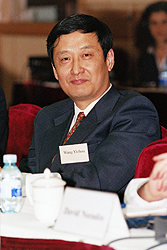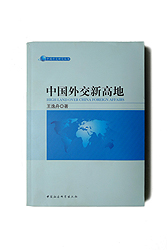| High Land Over China Foreign Affairs is a newly published book written by Wang Yizhou, Deputy Director of the Institute of World Economics and Politics, at the Chinese Academy of Social Sciences. The book focuses on China's progress in pushing forward its diplomatic policies in the past 30 years. It discusses the characteristics of Chinese diplomacy, and the opportunities as well as challenges the country will face as it grows in a changing world. It also provides suggestions on how China can provide more public goods to the world, how to communicate with different non-governmental organizations (NGOs) and how to deal with the new challenges brought by traditional and non-traditional security threats. Recently, Beijing Review reporter Ding Ying discussed the book with the author.
Beijing Review: Would you give a brief introduction to your new book, High Land Over China Foreign Affairs?
 |
|
Wang Yizhou, Deputy Director of the Institute of World Economics and Politics, Chinese Academy of Social Sciences | Wang Yizhou: High Land Over China Foreign Affairs mainly introduces the changes in Chinese diplomacy and its international relationships in the past three decades. In other words, it talks about what Chinese diplomacy was, what it is and what it will be.
Since the People's Republic of China was founded 60 years ago, and especially in the past 30 years, Chinese diplomacy and study of international relationships have entered a new phase. As the title of my book suggests, Chinese diplomacy is now stepping onto a new high. China used to be a country that shut its door to the international community and was satisfied with its self-sufficient economy. But now it has grown to be a regional power and a middle power that has global influence.
The book is also a summary, reconsideration and analysis of Chinese diplomacy in the past 60 years. I provide more criticism of the first 30 years, because there were a lot of problems and contradictions in Chinese diplomacy that needed to be rethought. The next 30 years saw greater development and progress.

"High land" has two different connotations. On one hand, high land represents more beautiful scenery, greater benefits and more interests and opportunities. On the other hand, it's like what the traditional Chinese expression says: One is likely to feel colder at higher altitudes. China will face troubles that it never faced in the past at this new height. Besides, we Chinese never feel the country has become super big as other countries do. Based on that consideration, my book aims to remind readers, especially those who are in diplomatic and international studies circles, that opportunity always coexists with challenge, just like the two sides of one coin.
We don't have answers to many questions in the new era, and we need to continue our studies with diplomatic theory and practice combined. Diplomacy needs summing-up and reconsideration from time to time, too. State leaders play the most important role in diplomacy, but diplomacy is not just for leaders. Researchers can also offer a helping hand to decision-makers.
What are the new characteristics of Chinese diplomacy?
Chinese diplomacy began to change after reform and opening up some 30 years ago, thus developing new characteristics.
Chinese diplomacy focuses on four different aspects: big powers, developing countries, neighboring countries, and multilateral mechanisms including international organizations. Generally speaking, China does pretty well in dealing with issues of the four different aspects.
What progress has Chinese diplomacy made in the past 30 years?
During the 30 years since the launch of reform and opening up, different state leaders have showed different styles in making foreign policy. But what they have in common is the continuity and creativity of their foreign policies.
As the first state leader in the opening-up period, Deng Xiaoping set a general framework for Chinese diplomacy. Mao Zedong set up an independent state that did not allow foreign intervention, but it was Deng who led the country to prosperity and opening up.
When Jiang Zemin became the state leader, the world faced multiple international crises. At one time, the international community expected China to collapse like the Soviet Union. China not only survived but also conducted a new round of opening up. During this period, China stressed new concepts of security, a multilateral and diversified world, and coexistence and cooperation between different civilizations. China also paid attention to cooperation with big powers like Russia and the United States. Under Jiang's leadership, there were a lot of creativity and development in Chinese diplomacy.
| 